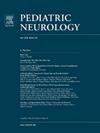Yield of Whole Exome Sequencing in Children With Cryptogenic Cerebral Palsy
IF 2.1
3区 医学
Q2 CLINICAL NEUROLOGY
引用次数: 0
Abstract
Background
Recent studies indicate that a significant number of patients with cerebral palsy (CP) may have a genetic cause. However, data from India are limited, where inheritance patterns are likely to be different. We examined the yield of next-generation sequencing in identifying the genetic causes of CP in children with unclear etiology and described the genetic spectrum found.
Methods
Whole-exome sequencing (WES) was performed on 71 children with CP (aged under 18 years, with a stable, nonprogressive course) in whom no acquired cause was identified clinically or radiologically.
Results
The yield of WES was 53.52% (38 of 71 cases) for pathogenic (P) and likely-pathogenic (LP) variants, and 78.87% when including variants of uncertain significance. We identified 54 variants (12 P, 24 LP, and 18 variants of uncertain significance) across 46 genes, along with two pathogenic copy number variants in 38 of the 71 cases. Genes such as AP4M1, ACSF1, AP4S1, and HACE1 showed P/LP variants in more than 1 case. The most common inheritance pattern (found in 30 of 38 cases) was autosomal recessive (78.95%), mainly due to high consanguinity in the cohort [53 of 71 (74.65%)]. We identified nine hereditary spastic paraplegia genes in 13 patients, three cases with Aicardi-Goutières syndrome genes, and four with genes associated with congenital disorders of glycosylation. The genes exhibited diverse pathogenic mechanisms, reflecting the heterogeneity of CP genes.
Conclusions
Careful selection of cohorts can enhance the genetic yield of WES in CP. Autosomal recessive variants are more common in populations with high rates of consanguinity.
隐源性脑瘫患儿全外显子组测序结果
最近的研究表明,相当数量的脑瘫(CP)患者可能有遗传原因。然而,来自印度的数据有限,那里的遗传模式可能不同。我们检查了下一代测序在确定病因不明的儿童CP遗传原因方面的产量,并描述了发现的遗传谱。方法对71例CP患儿(年龄在18岁以下,病程稳定,无进展)进行全外显子组测序(WES),临床或影像学均未发现获得性病因。结果致病性变异(P)和可能致病性变异(LP)的WES检测率为53.52%(38 / 71),包括意义不确定变异的WES检测率为78.87%。我们鉴定了46个基因中的54个变异(12个P, 24个LP和18个不确定意义的变异),以及71例中38例的两个致病拷贝数变异。AP4M1、ACSF1、AP4S1、HACE1等基因在1例以上出现P/LP变异。最常见的遗传模式为常染色体隐性遗传(38例中有30例)(78.95%),这主要是由于该队列的高血缘关系[71例中有53例(74.65%)]。我们在13例患者中发现了9个遗传性痉挛性截瘫基因,其中3例为aicardii - gouti综合征基因,4例为先天性糖基化疾病相关基因。这些基因表现出不同的致病机制,反映了CP基因的异质性。结论精心选择队列可提高CP患者WES的遗传产率,常染色体隐性变异在高亲缘人群中更为常见。
本文章由计算机程序翻译,如有差异,请以英文原文为准。
求助全文
约1分钟内获得全文
求助全文
来源期刊

Pediatric neurology
医学-临床神经学
CiteScore
4.80
自引率
2.60%
发文量
176
审稿时长
78 days
期刊介绍:
Pediatric Neurology publishes timely peer-reviewed clinical and research articles covering all aspects of the developing nervous system.
Pediatric Neurology features up-to-the-minute publication of the latest advances in the diagnosis, management, and treatment of pediatric neurologic disorders. The journal''s editor, E. Steve Roach, in conjunction with the team of Associate Editors, heads an internationally recognized editorial board, ensuring the most authoritative and extensive coverage of the field. Among the topics covered are: epilepsy, mitochondrial diseases, congenital malformations, chromosomopathies, peripheral neuropathies, perinatal and childhood stroke, cerebral palsy, as well as other diseases affecting the developing nervous system.
 求助内容:
求助内容: 应助结果提醒方式:
应助结果提醒方式:


